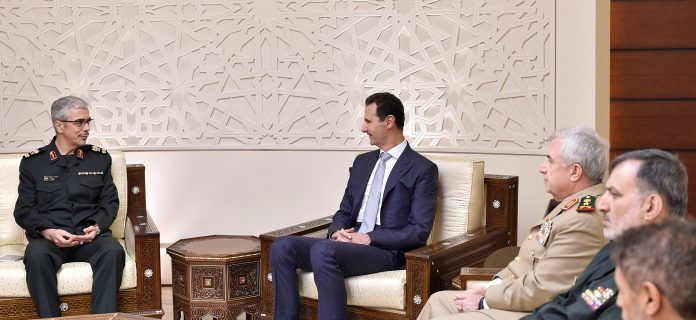
By Fayaz Sara, Asharq Al-Awsat (Arabic-language daily based in London)
The presence of Iranian military bases in Syria is a matter of concern to Syrian opposition groups, Russia, Turkey, Israel, regional Arab countries, the U.S., and most European governments, notably Britain, Germany, and France.
While the West has openly criticized Iran’s military role in Syria for years, it is the first time that Tehran’s closest allies — namely Moscow and Damascus — have publicly expressed their concerns over the growing influence of the Islamic Revolutionary Guards Corps (IRGC) in that country. The new political stance by Moscow and Damascus, aimed at pleasing the West, has prompted Iran to deny the existence of military bases in Syria altogether.
The international community’s overwhelming opposition to Iran’s role in Syria stems from the fact that Tehran has organized its foreign policy around religious and sectarian fault lines in Syria, and this, as far as the regional powers and the West are concerned, is the biggest obstacle on the path to peace in that country. All future governing systems in Syria must be secular in nature to protect the civil rights of the country’s multiethnic and multireligious population.
Moscow would be able to negotiate more effectively with the Syrian opposition forces in Syria if Iran were to lose its political and military influence in that country. Arab countries in the region are not engaged in a religious dispute with Russia in the same way that they are with Iran. The withdrawal of Iranian forces from Syria would make it easier for Moscow and Damascus to normalize their ties with the international community. It is, therefore, not surprising that Moscow and Damascus have openly opposed the existence of IRGC bases in Syria.
[aesop_image img=”https://kayhanlife.com/wp-content/uploads/2018/09/zaif-assad.jpg” panorama=”off” credit=” SANA/Handout via REUTERS” align=”center” lightbox=”on” caption=”Syrian President Bashar al-Assad meets with Iran’s Foreign Minister Mohammad Javad Zarif in Damascus, Syria September 3, 2018.” captionposition=”left” revealfx=”off” overlay_revealfx=”off”]
The Iranian military presence in Syria falls into two categories. The first group is made up of military advisors, intelligence officers and communication experts who operate from inside Syrian army bases. President Bashar al-Assad’s forces do not place key territories under the command of these Iranian military units.
The second group consist of IRGC’s Qods Force (IRGC-QF), which are highly trained special forces, and operate from their command and control headquarters at the Damascus International Airport. Their principal duties are to liaise between command headquarters in Tehran and Damascus and address financial, military and personnel requirements for the operations in Syria. They are the heart of the Iranian military’s command and control operation in Syria, and that’s the reason the Israeli air force has repeatedly targeted them. They control and direct the activities of pro-Iranian forces in and around Damascus as well those at military airbases in Al-Zamir at the outskirt of the capital, Shayrat in Homs and Tiyas (T-4) near Palmyra.
In addition to the regular army and the IRGC forces, there are other Shia combat units which operate under the auspices of the Iranian military in Syria, including the Fatemiyoun Brigade (Afghan fighters), the Zainab Brigades (Pakistani combat units), the Lebanese Hezbollah and Iraqi and Syrian militias.
[aesop_image img=”https://kayhanlife.com/wp-content/uploads/2018/11/4-3.jpg” panorama=”off” align=”center” lightbox=”on” caption=”A group of Afghan’s fighters in Syria. Source: Kayhan London” captionposition=”left” revealfx=”off” overlay_revealfx=”off”]
Iran has tried to strengthen its military presence in Syria in the past 40 years and also expanded its cultural and economic influence in that country. Tehran was able to successfully fuel sectarian conflict in Syria and subvert the course of the peaceful popular civil uprising in 2011, which ultimately resulted in a bloody civil war. The Islamic Republic regime effectively exploited the situation to its advantage and increased its political and cultural influence in Syria.
Pro-Assad forces and indeed most of the countries in the region are more concerned about Iran’s presence in Syria than Russia’s military role in that country because they are not engaged in a religious conflict with Moscow. Russia doesn’t promote sectarian disputes, ethnic conflicts, and religious ideology.
Efforts to confront the Islamic Republic should, therefore, not be limited to forcing IRGC forces and pro-Iranian militias out of Syria, but also to uproot the destructive influence that the regime has exerted on Syrian culture and society for the last 40 years. Otherwise all efforts to end the Syrian conflict would be an exercise in futility.
Translated from Persian by Fardine Hamidi

